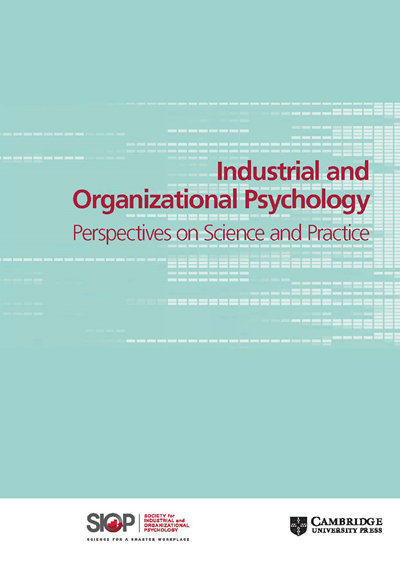Openness maximizes advocacy
IF 4.3
3区 心理学
Q1 PSYCHOLOGY, APPLIED
Industrial and Organizational Psychology-Perspectives on Science and Practice
Pub Date : 2022-12-01
DOI:10.1017/iop.2022.65
引用次数: 0
Abstract
In their focal article, Guzzo et al. (2022) raise several critical points about how moves toward “opening” psychological science have the potential to both advance and hinder the progress of the field of I-O psychology. Of these points, the focal article raises several concerns about how the duality between science and practice may be hindered by demands for openness. Although excellent points are raised, the focal article draws out a long-standing false division between science and practice to frame its arguments. We also take issue with the broader contention that the zeitgeist of openness will hinder the progress of our field, both for science and practice. Indeed, we see this notion, and the furthering of the scientist–practitioner divide in service of supporting arguments, as vast oversimplifications of a complex challenge that our field faces—that is, how we can maximize the impact of I-O psychology for our constituents. To counter these points, we argue that openness is a key condition for maximizing the impact of I-O psychology research and practice. Importantly, we do not view “science” versus “practice” as a meaningful distinction. Rather, we see a continuum existing between the science and practice of I-O psychology, with one benefiting the other. Similarly, openness is not a monolithic “one size fits all” approach to either science or practice. Rather openness, which likewise exists along a continuum, may variously dictate the conduct of science and practice. The continuum of openness is a context in which science and practice operate to the benefit or detriment of advocacy. We see “advocacy” as actions taken by I-O psychologists to benefit society and improve the lives of people at work (see Mallinckrodt et al., 2014). The focal articles seems to lose sight of the common goal of both the science and practice of I-O psychology, which is to serve as the basis for advocating for the betterment of work for all employees. The idea of a scientist–practitioner–advocate perspective is not new (see Fassinger & O’Brien, 2000; Lewin, 1948/1997) but has been gaining traction as a model for thinking about the impacts that psychological science and practice can have on society (see Mallinckrodt et al., 2014; Miles & Fassinger, 2021). However, the idea of advocacy as a goal of the science and practice of I-O psychology is often ignored in the science–practice debates that characterize our field (e.g., Aguinis et al., 2020). To our minds, both science and practice serve the same goal, which is to facilitate the improvement of work by means of advocacy. Rather than positioning openness as a barrier, we offer that it serves as a condition for maximizing the impact of both science and practice, because it strengthens the potential for advocacy. There are numerous examples of how this could be realized. For example, movements toward the open sharing of data, materials, and code allow others to reproduce and replicate findings, and the preregistration of hypotheses prevents post hoc theorizing and thus leads to more trustworthy research. Additionally, open access to published work puts the results of research into the hands of those who stand to benefit most from its dissemination, such as practitioners and policy makers. These ideas benefit not only science but also practice through bolstering our credibility to external stakeholders (Rudolph, 2021).公开性最大限度地宣传
在他们的重点文章中,Guzzo等人(2022)提出了几个关键点,说明“开放”心理科学的举措如何既可能推动也可能阻碍I-O心理学领域的发展。在这些观点中,这篇重点文章提出了几个问题,即科学与实践之间的二元性如何可能受到开放性要求的阻碍。虽然提出了优秀的观点,但重点文章在科学与实践之间划出了一个长期存在的错误划分,以构建其论点。我们还对更广泛的争论提出异议,即开放的时代精神将阻碍我们领域的进步,无论是在科学上还是在实践上。事实上,我们认为这个概念,以及为支持论点而进一步深化的科学家-实践者分歧,是对我们这个领域所面临的复杂挑战的过度简化——也就是说,我们如何才能最大限度地发挥I-O心理学对我们的选民的影响。为了反驳这些观点,我们认为开放性是I-O心理学研究和实践影响最大化的关键条件。重要的是,我们并不认为“科学”和“实践”是一个有意义的区别。相反,我们看到在I-O心理学的科学和实践之间存在一个连续体,一个有利于另一个。同样,对于科学或实践,开放也不是一种“一刀切”的单一方法。相反,开放性,同样存在于一个连续体中,可能以不同的方式决定科学和实践的行为。开放性的连续性是一种背景,在这种背景下,科学和实践的运作对倡导有益或有害。我们将“倡导”视为I-O心理学家为造福社会和改善工作人员生活而采取的行动(见Mallinckrodt等人,2014)。焦点文章似乎忽视了I-O心理学的科学和实践的共同目标,即作为倡导改善所有员工工作的基础。科学家-从业者-倡导者的观点并不新鲜(见Fassinger & O 'Brien, 2000;Lewin, 1948/1997),但作为一种思考心理科学和实践对社会影响的模式(见Mallinckrodt等人,2014;Miles & Fassinger, 2021)。然而,倡导作为I-O心理学的科学和实践目标的想法,在我们这个领域的科学-实践辩论中经常被忽视(例如,Aguinis等人,2020)。在我们看来,科学和实践的目的是一致的,那就是通过宣传来促进工作的改进。我们没有将开放定位为障碍,而是认为它是科学和实践影响最大化的条件,因为它增强了倡导的潜力。关于如何实现这一点,有许多例子。例如,数据、材料和代码的开放共享允许其他人复制和复制发现,假设的预登记防止了事后的理论化,从而导致了更值得信赖的研究。此外,对已发表作品的开放获取将研究成果交到那些能够从其传播中获益最多的人手中,例如从业人员和决策者。这些想法不仅有利于科学,而且通过增强我们对外部利益相关者的可信度,也有利于实践(Rudolph, 2021)。
本文章由计算机程序翻译,如有差异,请以英文原文为准。
求助全文
约1分钟内获得全文
求助全文
来源期刊

Industrial and Organizational Psychology-Perspectives on Science and Practice
PSYCHOLOGY, APPLIED-
CiteScore
7.70
自引率
10.10%
发文量
85
期刊介绍:
Industrial and Organizational Psychology-Perspectives on Science and Practice is a peer-reviewed academic journal published on behalf of the Society for Industrial and Organizational Psychology. The journal focuses on interactive exchanges on topics of importance to the science and practice of the field. It features articles that present new ideas or different takes on existing ideas, stimulating dialogue about important issues in the field. Additionally, the journal is indexed and abstracted in Clarivate Analytics SSCI, Clarivate Analytics Web of Science, European Reference Index for the Humanities and Social Sciences (ERIH PLUS), ProQuest, PsycINFO, and Scopus.
 求助内容:
求助内容: 应助结果提醒方式:
应助结果提醒方式:


